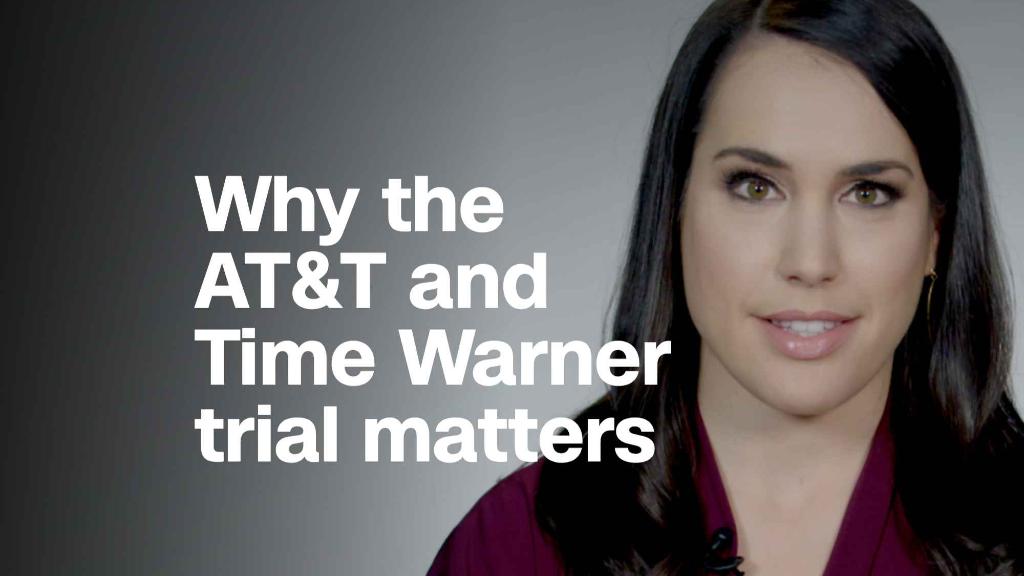
AT&T's acquisition of Time Warner would not be anticompetitive and could even cause a price drop for consumers, an economist testified for AT&T on Thursday in the trial over the Justice Department's antitrust suit against the two companies' proposed merger.
The companies' expert witness, Professor Dennis Carlton, took the stand as part of an attempt by their attorneys to refute Wednesday's testimony by the government's expert witness, Professor Carl Shapiro, who said that his economic modeling has shown that the merger would cause prices to go up for consumers.
"The evidence does not support the government's claim that the merger will harm consumers ... in fact, it will benefit them," Carlton said.
Last fall, the Justice Department sued to stop AT&T's $85 billion acquisition of Time Warner, which owns HBO, Warner Bros., and the Turner networks, including CNN. The government has claimed that with the Turner content, AT&T will have too much bargaining leverage with other pay-TV distributors, which will as a result raise prices for consumers.
Making an unusual appearance as an attorney arguing for the government on Thursday was the head of the Justice Department's antitrust division, Makan Delrahim.
"My goodness gracious," Judge Richard Leon said as Delrahim approached the bench to announce his name. "Honored to have you."
Though Carlton is the first witness for AT&T and Time Warner, the government has not actually rested its own case yet. Leon, who will rule on the case himself without a jury, announced that both parties had agreed to let Carlton testify so that he could benefit from having the two experts appear back to back. Carlton is a University of Chicago professor who has worked in the Justice Department under George W. Bush as well as for the Federal Trade Commission and served on a congressional committee investigating antitrust laws.
Cartlon laid out seven conclusions he reached in his own analysis, most of which were rebuttals of Shapiro's methods or conclusions. First, he said, if AT&T owns Turner, prices for customers of AT&T's satellite TV provider DirecTV will fall, prompting rivals to lower their prices as well.
Carlton argued that the empirical evidence does not statistically support the government's argument that prices will rise because of past precedent, specifically pointing to three mergers he said were similar to this case, such as Comcast's acquisition of NBCUniversal in 2011.
Carlton said Shapiro's model is "theoretically unsound" because it does not consider Turner's arbitration offer, long term contracts now in place which would prohibit price increases, or current Federal Communication Commission access rules which Shapiro said would apply to the merged entity. Turner's arbitration offer was presented to 1,000 cable distributors after the government filed its lawsuit last year and guarantees distributors no blackouts and baseball-style arbitration for seven years in the event a distributor believes Turner is charging too much for its content.
Carlton said Shapiro's model was "complicated" and that it made "a lot of assumptions."
Leon piped in, saying he found the model "like a Rube-Goldberg contraption," a reference to complicated gadgets designed for simple tasks.
Carlton also said Shapiro's model misstates three key inputs: The number of subscribers a rival pay-TV distributor might lose if it lost access to the Turner networks, the number of people dropping cable all together -- or "cord cutters" -- and that Shapiro was using outdated numbers for AT&T's profit margins, which Carlton said have since gone down. Carlton said even changing one or two of those inputs would "flip the results" and possibly even show a price decrease for consumers.
Carlton also said that Shapiro's estimated price increase equals less than a dollar per customer per month and that Shapiro did not conduct a statistical test "to convince the court" that the small increase is statistically significant.
"It would be a real mistake to stop a merger because an expert, even as qualified as Professor Shapiro, says there would be a tiny price increase," Carlton said. "It's a dangerous standard to pursue."
Carlton rounded out his conclusions claiming that Shapiro did not take into account competition from new entrants on the market like Amazon, Netflix and Google, and that Shapiro did not give theoretical evidence on two of the government's other allegations, that AT&T would restrict a rival's use of HBO as a promotional tool or that AT&T would have an incentive to coordinate with Comcast.
Upon cross examination, the government's lead attorney Craig Conrath noted that new entrants are not yet substitutes for events like live sports, a major factor that he says makes Turner content exceptionally valuable for distributors. Carlton said his analysis did not take into consideration what would happen to live sporting events should the merger go through and blackouts ensue during distributor disputes.
Conrath revisited Carlton's earlier remark about long-term contracts and noted that though one very large distributor has a long-term contract, several others have contracts which end within the next year or two, and would therefore be subject to a possible price increase.
Conrath also questioned Carlton's use of what the professor claimed was newer AT&T profit margin data, which he used in his analysis to conclude that the merger would result in less harm than what Shapiro's calculations predicted. But Conrath noted that Shapiro was using an average of several months' worth of data, while Carlton focused on data from just one month, even though he had access to more. Carlton defended his data, saying it was most recent.
The trial will resume Monday when AT&T is expected to call two expert witnesses who will testify about FCC rules and survey methods.
The government still has to call on one more witness, who will appear on Tuesday.


